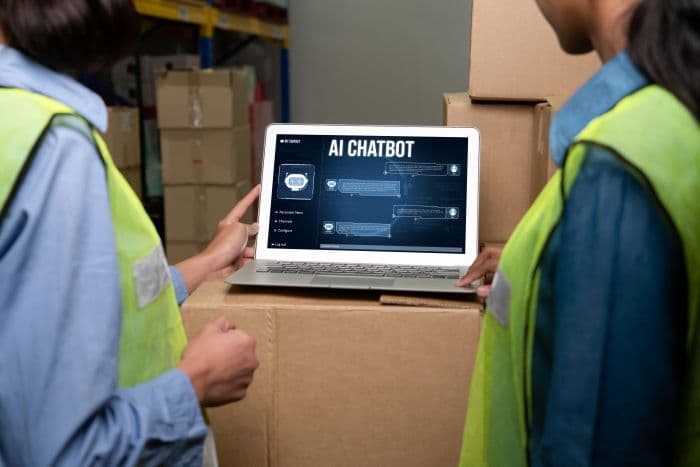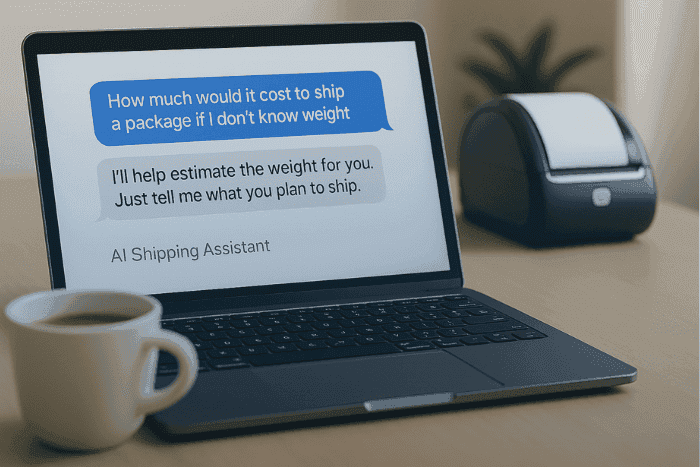Artificial Intelligence in Logistics is the integration of advanced technologies like machine learning, computer vision, and predictive analytics to automate, optimize, and streamline supply chain operations. By implementing AI logistics, companies can transform vast amounts of raw data into actionable insights, allowing for smarter decision-making in real-time.
Whether you are managing a local courier service or a global distribution network, understanding the impact of artificial intelligence in logistics and supply chain operations is crucial. This guide explores how AI is reshaping the industry, the core use cases driving ROI, and how Airpals’ conversational AI platform is leading the charge in shipping automation.
Table of Contents:
- How AI is Transforming the Supply Chain Industry
- 7 Real-World Use Cases of AI Logistics
- Revolutionizing the Road: Artificial Intelligence in Transportation
- The Smart Hub: Managing an Artificial Intelligence Warehouse
- Meet the Future: Airpals’ Conversational AI Platform
- What are the challenges of implementing AI in logistics?
- Measurable Results: The ROI of Artificial Intelligence in Logistics
- Key Takeaways on Artificial Intelligence in Logistics
- Conclusion: Start Your AI Journey Today
- Frequently Asked Questions (FAQs)
How AI is Transforming the Supply Chain Industry
The integration of AI in logistics and supply chain has moved beyond simple automation. Today, AI analyzes vast amounts of data to make real-time decisions that were previously impossible. By leveraging AI in supply chain management, companies can now predict disruptions before they happen, allowing for proactive measures that save thousands in potential losses.
In the United States, the logistics sector is facing unprecedented pressure from rising fuel costs and labor shortages. This is where AI logistics becomes a competitive advantage. It facilitates the automation of repetitive tasks, freeing up valuable time for employees to focus on strategic initiatives rather than manual data entry or carrier tracking.
What are the main benefits of AI for supply chain management?
Companies leveraging AI in supply chain management gain valuable insights into their operations, facilitating continuous improvement. The results are clear: reduced operational costs, improved customer satisfaction, and a significant competitive edge in a fast-paced environment.
7 Real-World Use Cases of AI Logistics
To understand the full scope of artificial intelligence in logistics, let's look at seven specific applications that are driving ROI today: 1. Demand Forecasting: Analyzing market trends and historical data to predict future needs, ensuring lean and efficient inventory management. 2. Dynamic Route Optimization: Algorithms that calculate the most efficient paths in real-time, significantly reducing fuel consumption and transit time. 3. Warehouse Automation: Integrating robotics and intelligent systems to streamline picking and sorting operations within fulfillment centers. 4. AI-Powered Chatbots: Using a conversational interface to estimate package dimensions, compare carrier rates, and coordinate shipping tasks through simple prompts. 5. Smart Labeling: Automatically generating carrier shipping labels based on conversation data, eliminating manual entry errors. 6. Predictive Maintenance: Fleet health monitoring to prevent transportation delays and mechanical downtime. 7. Office Logistics Automation: Automating repetitive shipping processes so teams can focus on high-impact operational tasks.

Revolutionizing the Road: Artificial Intelligence in Transportation
Shipping is often the most expensive and volatile part of the logistics chain. However, artificial intelligence in transportation is drastically reducing these overheads.
Route Optimization
Through AI logistics, software can now calculate the most efficient routes by analyzing real-time traffic, road conditions, and vehicle capacity. This doesn't just save time; it significantly reduces fuel consumption and carbon footprints, a key priority for modern U.S. enterprises.
Autonomous Fleets and Fleet Management
We are seeing a surge in artificial intelligence in transportation regarding vehicle health. AI monitors engine performance and predicts when a truck needs maintenance before it breaks down on the highway. This level of foresight is only possible through integrated AI in logistics and supply chain data.
The Smart Hub: Managing an Artificial Intelligence Warehouse
The warehouse is where most bottlenecks occur. Integrating an artificial intelligence warehouse strategy can eliminate these pain points and double fulfillment speed.
How does AI improve warehouse operations?
Inside AI warehouses, robots and computer vision systems work alongside human staff to sort packages with 99.9% accuracy. By using AI in warehouses, the "path to pick" is optimized, meaning less time spent walking and more time spent shipping.
Key advantages of an artificial intelligence warehouse:
- Inventory Intelligence: Ai in warehouses provides a digital twin of the physical space, tracking every SKU in real-time.
- Automated Sorting: High-speed picking systems driven by artificial intelligence warehouse software.
- Space Optimization: AI analyzes stock movement to reorganize the warehouse layout dynamically.
Meet the Future: Airpals’ Conversational AI Platform
At Airpals, we didn't just want to follow the trend of artificial intelligence in logistics; we wanted to solve the most frustrating part of shipping: the communication and coordination gap. This led us to develop the first Conversational AI Platform dedicated to logistics.
Shipping AI: The Smart Alternative Solution
Our AI Shipping Assistant revolutionizes package handling with a conversational interface. It uses advanced data and conversational prompts to do the heavy lifting for you, providing:
- Accurate AI-Driven Weight and Dimension Estimates: Just describe your package, and the AI Assistant draws from thousands of real-world shipping data points to instantly calculate weight and dimensions. No scale or lengthy forms are required.
- Real-Time Shipping Rate Comparisons: Once estimated, it shows you live rates from top carriers like UPS, USPS, and FedEx. No more bouncing between platforms or endless open tabs.
- Create Shipping Labels via Conversation: It helps you generate shipping labels in just a few clicks. Everything happens on one easy-to-use platform: choose the best option, print your label, and you’re ready to go.
Our intuitive conversational AI platform is designed for workplace operators and logistics teams who want to ship confidently, with a smooth, efficient process that happens on one easy-to-use platform, saving you time and eliminating usual shipping stress.
What are the challenges of implementing AI in logistics?
Despite the clear advantages, the journey to a fully integrated AI in logistics and supply chain models has its hurdles. It is important to address these for a successful transition:
- Initial Investment: Upgrading to an artificial intelligence warehouse requires upfront capital for hardware.
- Data Privacy & Security: Protecting sensitive customer data within an AI logistics framework.
- Integration with Legacy Systems: Making sure your AI-driven tools talk to your old ERP.
- Skilled Personnel: The need for teams that know how to manage and interpret AI-generated insights.
- Resistance to Change: Overcoming the "we've always done it this way" mentality among stakeholders.
Measurable Results: The ROI of Artificial Intelligence in Logistics
What are the actual results of these implementations? According to global research from leading firms like McKinsey & Company, businesses that integrate AI in supply chain management report:
- 15% reduction in overall logistics and transportation costs.
- 20% improvement in delivery speed and operational efficiency.
- 35% increase in warehouse productivity through automated picking and sorting, reducing manual labor time.
These metrics prove that artificial intelligence in logistics is not just a trend but a strategic necessity for modern business growth.
Key Takeaways on Artificial Intelligence in Logistics
- AI in logistics has moved from experimentation to real-world impact, helping companies reduce costs, improve speed, and gain operational visibility
- The highest ROI use cases today include demand forecasting, route optimization, warehouse automation, and conversational AI for shipping coordination.
- Transportation and warehouse operations benefit the most, with AI enabling predictive maintenance, smarter routing, faster fulfillment, and more efficient space utilization.
- Platforms like Airpals apply conversational AI to everyday shipping, enabling teams to estimate packages, compare carrier rates, and generate labels through a single interface.
Conclusion: Start Your AI Journey Today
The future of the industry belongs to those who master artificial intelligence in logistics. From the way we manage an artificial intelligence warehouse to how we generate labels via a conversational AI platform, the transformation is here.
Don't let your business get left behind in the "manual age." Embrace the power of AI logistics and see how AI in supply chain management can transform your bottom line.
Ready to simplify your shipping? Try the Airpals AI Shipping Assistant today and experience how the first AI-powered shipping platform in the U.S. can estimate weights, compare rates, and generate labels in seconds. No scale required, just a simple conversation.

Frequently Asked Questions
Where is artificial intelligence used?
Artificial intelligence is everywhere, from healthcare and finance to retail and logistics. In these sectors, AI improves processes, supports decision-making, and enhances customer experiences by making operations faster, more accurate, and more reliable.
How is AI being used in logistics?
In logistics, AI has a transformative impact, helping companies predict demand, optimize routes, manage inventory, and provide top-notch customer service. With AI-powered software and chatbots, logistics companies can operate more efficiently and respond faster to customer needs, leading to higher satisfaction and trust.
How is AI changing the supply chain?
AI is reshaping the supply chain by making it more resilient, responsive, and precise. It allows companies to anticipate fluctuations in demand, minimize disruptions, and manage inventory more effectively, which results in smoother operations and improved customer confidence.
What are the applications of AI in logistics?
AI applications in logistics are broad, including demand forecasting, route optimization, customer support automation, and real-time inventory management. These AI-driven solutions make logistics processes more efficient and reduce the chances of delays, delivering a smoother experience for customers and partners alike.
How is AI used in transportation?
AI enhances transportation by selecting the best routes, reducing fuel consumption, tracking shipments in real-time, and even lowering environmental impact. This results in cost-effective logistics that customers can rely on for timely and dependable service.


